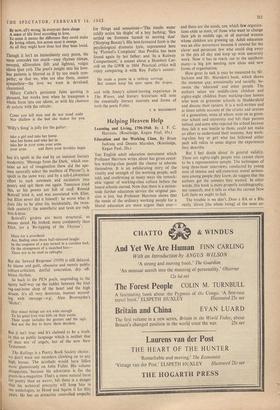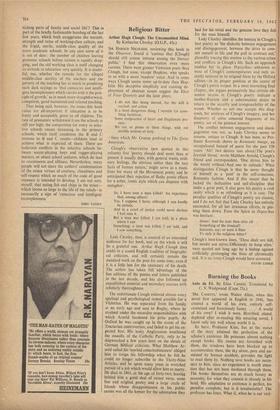Helping Heaven Help
Learning and Living, 1790-1960. By J. F. C. Harrison. (Routledge, Kegan Paul, 45s.)
THE English adult education movement which Professor Harrison writes about has given count- less working-class people the chance to educate themselves. It is an exhilarating story of the vitality and strength of the working people, well told, and confirming in many ways the remark- able vigour of working-class culture before the board schools started. Now that there is a nation- wide further education service the original pas- sion is lost, but Professor Harrison shows that the needs of the ordinary working people for a liberal education are more urgent than ever- and there are the needs, too, which few organisa- tions exist to meet, of those who want to change their job in middle age, or of married women whose children are growing up. Adult education was an elite movement because it catered for the clever and persistent few who could slog away in the pits all day and keep up with university work. Now it has to reach JUt to the apathetic many—a big job needing new ideas and new forms of organisation.
How great its task is may be measured by Mr. Jackson and Mr. Marsden's book, which shows the immense gap, emotionally and socially, be- tween the 'educated' and other people. The authors taken ten middle-class children and eighty-eight children from working-class homes who went to grammar schools in Huddersfield and discuss their careers. It is a well-written and at times subtle account of the strains and stresses of a generation, some of whom went on to gram- mar school and university and left their parents behind, and some who rejected the school because they felt it was hostile to them, could not make an effort to understand their tensions. Any work- ing-class boy or girl who has followed either path will relive in some degree the experiences they describe.
But I feel doubt about its general validity. These are eighty-eight people who cannot claim to be a representative sample. The techniques of long three-hour interviews, conducted by young men of intense and self-conscious moral serious- ness among people they know, do suggest that the authors got the answers they wanted. In other words, this book is more properly autobiography, not research, and it tells us what the current New Left feels we ought to feel.
The trouble is we don't., Does a BA or a BSc really 'divest [the whole being] of the most en-
riching parts of family and social life'? This is part of the briefly fashionable humbug of the last few years, which both exaggerates the warmth, strength and value of working-class culture, and the frigid, sterile, middle-class quality of the more academic schools. In any case some of it is out of date: the number of children leaving grammar schools before sixteen is rapidly drop- ping, and the old working class is itself changing its attitude to education very quickly. It is doubt- ful, too, whether the remedy for the alleged middle-class sterility of the teachers and the poverty of the teaching lies so much in pondering such dark sayings as 'that conscious and intelli- gent incompleteness which carries with it the prin- ciple of growth,' as in much more straightforward, competent, good-humoured and relaxed teaching.
That being said, however, the issues this book raises are all-important if education is to be freely and acceptably given to all children. The rate of premature withdrawal from the schools is still too high; the competition for entry to selec- tive schools causes streaming in the primary schools, which itself condemns the B and C streams to B and C results—children tend to achieve what is expected of them. There are ludicrous conflicts in the selective schools be- tween soccer-playing boys and rugger-playing masters, or about school uniform, which do lead to resentments and silliness. Nevertheless, many people will not share the authors' condemnation of the minor virtues of courtesy, cleanliness and self-respect which so much of the code of good manners is intended to develop. I am not sure, myself, that eating fish and chips in the street— which looms so large in the life of the rebels—is necessarily a sign of 'conscious and intelligent incompleteness.'
JOHN VAIZEY


































 Previous page
Previous page